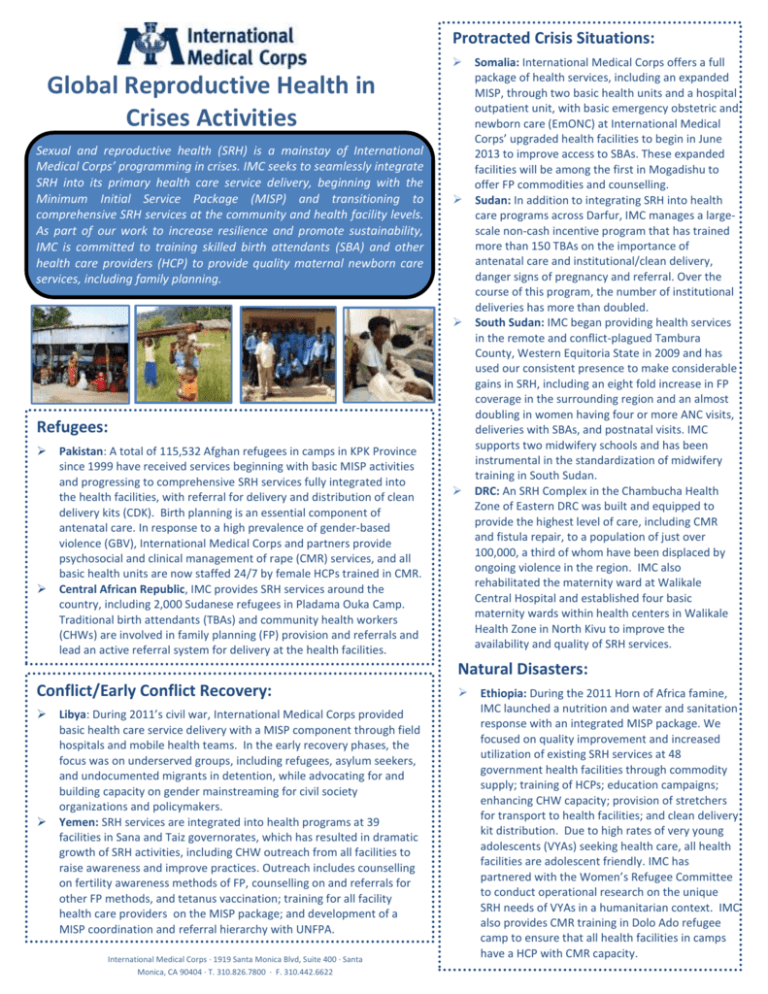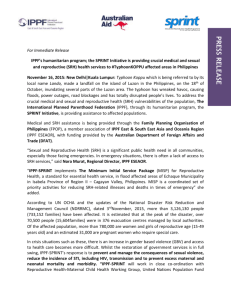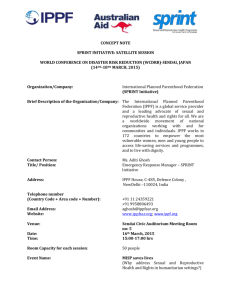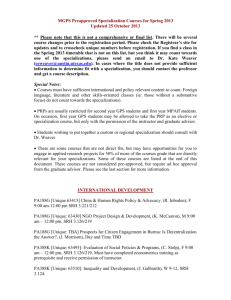International Medical Corps
advertisement

Protracted Crisis Situations: Global Reproductive Health in Crises Activities Sexual and reproductive health (SRH) is a mainstay of International Medical Corps’ programming in crises. IMC seeks to seamlessly integrate SRH into its primary health care service delivery, beginning with the Minimum Initial Service Package (MISP) and transitioning to comprehensive SRH services at the community and health facility levels. As part of our work to increase resilience and promote sustainability, IMC is committed to training skilled birth attendants (SBA) and other health care providers (HCP) to provide quality maternal newborn care services, including family planning. Refugees: Pakistan: A total of 115,532 Afghan refugees in camps in KPK Province since 1999 have received services beginning with basic MISP activities and progressing to comprehensive SRH services fully integrated into the health facilities, with referral for delivery and distribution of clean delivery kits (CDK). Birth planning is an essential component of antenatal care. In response to a high prevalence of gender-based violence (GBV), International Medical Corps and partners provide psychosocial and clinical management of rape (CMR) services, and all basic health units are now staffed 24/7 by female HCPs trained in CMR. Central African Republic, IMC provides SRH services around the country, including 2,000 Sudanese refugees in Pladama Ouka Camp. Traditional birth attendants (TBAs) and community health workers (CHWs) are involved in family planning (FP) provision and referrals and lead an active referral system for delivery at the health facilities. Somalia: International Medical Corps offers a full package of health services, including an expanded MISP, through two basic health units and a hospital outpatient unit, with basic emergency obstetric and newborn care (EmONC) at International Medical Corps’ upgraded health facilities to begin in June 2013 to improve access to SBAs. These expanded facilities will be among the first in Mogadishu to offer FP commodities and counselling. Sudan: In addition to integrating SRH into health care programs across Darfur, IMC manages a largescale non-cash incentive program that has trained more than 150 TBAs on the importance of antenatal care and institutional/clean delivery, danger signs of pregnancy and referral. Over the course of this program, the number of institutional deliveries has more than doubled. South Sudan: IMC began providing health services in the remote and conflict-plagued Tambura County, Western Equitoria State in 2009 and has used our consistent presence to make considerable gains in SRH, including an eight fold increase in FP coverage in the surrounding region and an almost doubling in women having four or more ANC visits, deliveries with SBAs, and postnatal visits. IMC supports two midwifery schools and has been instrumental in the standardization of midwifery training in South Sudan. DRC: An SRH Complex in the Chambucha Health Zone of Eastern DRC was built and equipped to provide the highest level of care, including CMR and fistula repair, to a population of just over 100,000, a third of whom have been displaced by ongoing violence in the region. IMC also rehabilitated the maternity ward at Walikale Central Hospital and established four basic maternity wards within health centers in Walikale Health Zone in North Kivu to improve the availability and quality of SRH services. Natural Disasters: Conflict/Early Conflict Recovery: Libya: During 2011’s civil war, International Medical Corps provided basic health care service delivery with a MISP component through field hospitals and mobile health teams. In the early recovery phases, the focus was on underserved groups, including refugees, asylum seekers, and undocumented migrants in detention, while advocating for and building capacity on gender mainstreaming for civil society organizations and policymakers. Yemen: SRH services are integrated into health programs at 39 facilities in Sana and Taiz governorates, which has resulted in dramatic growth of SRH activities, including CHW outreach from all facilities to raise awareness and improve practices. Outreach includes counselling on fertility awareness methods of FP, counselling on and referrals for other FP methods, and tetanus vaccination; training for all facility health care providers on the MISP package; and development of a MISP coordination and referral hierarchy with UNFPA. International Medical Corps ∙ 1919 Santa Monica Blvd, Suite 400 ∙ Santa Monica, CA 90404 ∙ T. 310.826.7800 ∙ F. 310.442.6622 Ethiopia: During the 2011 Horn of Africa famine, IMC launched a nutrition and water and sanitation response with an integrated MISP package. We focused on quality improvement and increased utilization of existing SRH services at 48 government health facilities through commodity supply; training of HCPs; education campaigns; enhancing CHW capacity; provision of stretchers for transport to health facilities; and clean delivery kit distribution. Due to high rates of very young adolescents (VYAs) seeking health care, all health facilities are adolescent friendly. IMC has partnered with the Women’s Refugee Committee to conduct operational research on the unique SRH needs of VYAs in a humanitarian context. IMC also provides CMR training in Dolo Ado refugee camp to ensure that all health facilities in camps have a HCP with CMR capacity.











